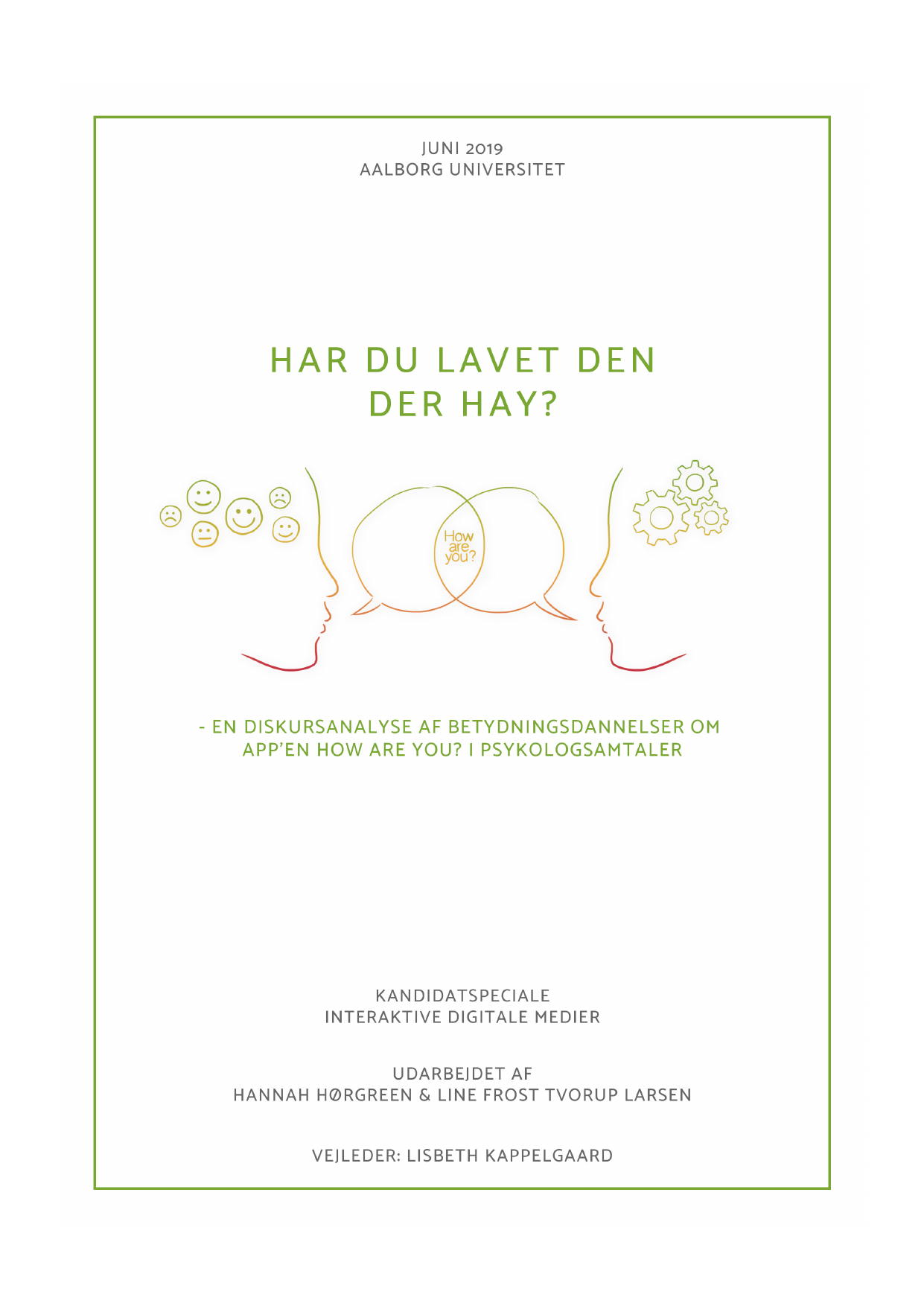
Har du lavet den der HAY? - En diskursanalyse af betydningsdannelser om app'en How Are You? i psykologsamtaler
Oversat titel
Did you do that HAY thing? - A discourse analysis of the mobile application How Are You? focusing on construction of meanings on the context of therapy sessions
Forfattere
Semester
4. semester
Uddannelse
Udgivelsesår
2019
Afleveret
2019-06-01
Antal sider
84
Abstract
Title: Did you do that HAY thing? - A discourse analysis of the mobile application How Are You? focusing on construction of meanings in the context of therapy sessions. Aim: The aim for this master thesis is to investigate the construction of meanings related to the self monitoring mobile app ‘How Are You?’ (HAY) which a therapist convey in interaction with clients, and how these constructions constitute roles and agencies between the therapist, the clients and the technology itself. Furthermore, we investigate how the concept ‘Conscious Self-management’ (‘Bevidst Selvledelse’ in danish) is articulated in relation to the HAY technology. Method: Fairclough’s discourse analysis framework is used to analyze various therapy sessions with the therapist and different clients. Micro-sociological traditions such as Conversation Analysis (CA) and perspectives from embodied interaction and gesture studies are used in the text analysis. Literature related to digital health, communication in healthcare and society buzzwords as ‘empowerment’ is used to frame the macro-sociological perspectives of the therapy sessions as a social practice. Findings: Three main discourses are identified. A ‘school discourse’ constitutes an asymmetrical relation between the therapist as a ‘teacher’ and the clients as ‘students’, and HAY is articulated as ‘homework’ that the client is obligated to do. A ‘legitimation discourse’ is identified in the therapist’s use of HAY as a tool for documentation and decision making, which constitutes the therapist as the ‘data expert’ and the client as a ‘data provider’. Finally, a ‘minimizing discourse’ is constructed by the therapist’s rushed and delayed presentation of HAY and the therapist’s forgiving attitude towards clients who don’t do the monitoring. This discourse constitutes the client as a ‘volunteer’ and HAY as something optional or of no importance. The therapist also articulates HAY as her own ‘duty’ and as something that she is obligated to show the clients by a third party. Conclusion: In conclusion, the concept of Conscious Self-management is not overall prominent. The three identified discourses draw upon social practices from school contexts and evidence-based practice which both are influenced by a paternalistic approach. We argue that these social practices, including the three identified discourses, contradict the clients’ inner motivation for using HAY in a long term perspective.
Emneord
selvmonitorering ; sundhedsteknologi ; mobilapplikation ; app ; sundhed ; trivsel ; humør ; diskursanalyse ; konversationsanalyse ; patient ; klient ; psykolog ; terapi ; praksis ; klinik ; klinisk praksis ; sundhedsprofessionel ; empowerment ; bevidst selvledelse ; selvledelse ; egenomsorg
